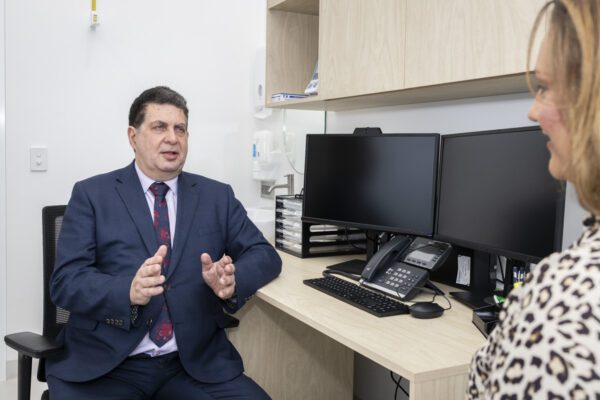According to research by Beyond Blue, almost three million Australians will experience significant symptoms of depression every twelve months. This means that almost one in seven Australians will be clinically diagnosed with the mental health disorder across their lifetime. How do you know if depression is affecting you?
Knowing the symptoms of depression
With depression being one of the most common mental health disorders in Australia, it is likely that you or someone you know will be affected by it at some stage. Knowing the signs and symptoms of depression is the first step to recognising whether a temporary low period could be something more serious.
What is depression?
From time to time, it is normal to experience negative emotions like sadness, apathy or tiredness. These feelings are a normal part of life. Although unpleasant, they are to be appreciated for their own benefits and contribution to our emotional functioning.

Typically, these emotions are in response to something upsetting. Perhaps we have lost a loved one, are experiencing stress or empathise with those around us who are down. Usually, we will still be able to find comfort or enjoyment in things we like, despite feeling “flat”. The feelings are fleeting and reconcilable.
The difference between sadness and depression
However, depression is more than just negative emotions. When these feelings create significant distress or impair our regular functioning, it may indicate the presence of an affective mental disorder like depression.
In a case of clinical depression, there is no clear reason for feeling down or withdrawn. We may feel hopeless about everything in life, and experience no desire to engage in the activities we usually enjoy.
What to look for: Signs and symptoms of depression
Depression is the shorthand term used to describe major depressive disorder. It is characterised by at least two weeks of consistent melancholy, hopelessness and apathy towards things they used to enjoy. There are many symptoms of depression, yet someone need not experience all of the signs to be affected.

Behavioural symptoms of depression
Often, the first signs of depression may appear in our behaviours. It is important that you take notice of these behavioural symptoms of depression, especially if they continue for a number of weeks. Things to watch out for include:
- A change in your sleeping patterns;
- Loss of pleasure or interest in usually enjoyable activities;
- Withdrawal from social interaction;
- Increased substance misuse, especially drugs, alcohol or prescription medication.
A change in sleeping patterns
Depression can cause drastic and varied impacts on our circadian rhythm and sleep cycle. Most often, people report increased fatigue or daytime sleepiness, which can lead to increased sleeping hours. Alternatively, others report insomnia, restlessness or irregularities in their night time sleep, in which they wake up regularly or struggle to fall asleep. All are symptoms of depression, and are typically observed in fatigue, slowness and apathy.

Loss of interest or pleasure in usually enjoyable activities
One of the necessary criteria for a clinical diagnosis of depression is the absence of enjoyment in our usual interests or activities. This particular marker of depression is quite prevalent, and can be distressing for those who rely on feelings of enjoyment and interest for contentment.
It is often this lack of enjoyment or interest that lead people to become disengaged or withdrawn from their everyday life. It can affect our motivation and creativity, leaving us feeling purposeless and flat.

Withdrawal from social interaction
When our mood is low and we are experiencing symptoms of depression, we may not feel like spending time with others or engaging in social activities. Unfortunately, isolation and loneliness are indicators of poor mental health and can exacerbate the symptoms of depression. Research has shown that isolation heightens the brains stress response, increasing inflamation and worsening our symptoms. However, social contact and interaction have the opposite effect, helping us feel more positive and hopeful.
Related: The social dimension of wellness
Increased substance misuse
Statistics indicate that approximately 1 in 3 adults who misuse substances also experience depression. We may be seeking to self-medicate our feelings of melancholy, suicidal ideation or worthlessness. As a result, we may be misusing alcohol, drugs or prescription medication to avoid our feelings.

Seek support for dual diagnosis at The Banyans
A presentation of both mental heath conditions and substance misuse is referred to by treating professionals as dual diagnosis. Dual diagnosis is a speciality treatment area of The Banyans Health and Wellness.
Our intensive treatment programs can provide rehab and recovery for both substance misuse and mental health disorders, like depression. Access a multimodal treatment program from some of Australia’s most highly qualified team of medical and allied health professionals.
Emotional signs of depression
There are many emotions signs and symptoms of depression. Many of these symptoms can arise at different times, making the experience of depression feel exhausting and confusing. Emotional symptoms of depression include feeling:
- Tearful, sensitive or emotional;
- Emotionally flat or numb;
- Worthless, guilty or shameful.
Many of the emotional symptoms of depression come with alarming or unhelpful thoughts, usually pertaining to our self-worth, hope for the future, or value of life. They may include thoughts such as, “I have no purpose”, or “No one really cares about me. All relationships end eventually.”

When paired with our emotional lows, we may be a risk of self-harm or even death. If this is something you are concerned about, make sure you contact 000 immediately, and seek professional support.
Physical symptoms of depression
Sometimes, the physical symptoms of depression are what impact us the most. Changes in the way our we experience our physical body or mind may be the earliest signs of clinical depression. Some common physical symptoms include:
- Loss of sexual interest;
- Physical aches and pains, including headaches, digestive issues and muscle cramps; or
- Impaired thinking, focus or concentration.
Loss of sexual interest
Throughout our lives, it is normal to experience fluctuation in your sexual desire. However, some people report decreased sexual interest as a common symptom of depression. This loss of libido and lower sex drive can be concerning for many people, and can have significant impacts on your romantic relationships.

Physical aches and pains
When we are experiencing clinical depression, we may experience a variety of physical health symptoms. Although we may be inclined to tell ourselves it’s “all in our head”, your body can be subject to very real side effects of poor mental health.
For example, depression and other mental health diagnosis like anxiety can have significant impacts on your digestive processes, slowing your system and creating discomfort. Moreover, you may feel nauseas, clammy, tight or knotted in the shoulders and back, or a variety of other physical aches or pains. Headaches are a common physical symptom.

Impaired focus and concentration
In what is often referred to as “brain fog”, depression can significantly impair your ability to focus on a particular task or train of thought, and is often responsible for forgetfulness. According to research from Harvard University, major depressive disorder can impact your thought life in numerous ways, including: attention and memory, information processing, decision-making skills, cognitive flexibility (the ability to adapt your goals and strategies to changing situations) and executive functioning (the ability to take all the steps to get something done).
Science suggests that depression alters the hormones in your brain that regulate productive thought. This is due to changes in the amygdala and hippocampus which are responsible for attention span. There also seems to be a negative feedback loop between low mood, stress and creative thinking, keeping us in a poor mental cycle when we feel trapped in depression.
Feeling overwhelmed by the symptoms of depression?
The Banyans have created a free downloadable symptom checklist to help you keep track of your personal signs and symptoms. Discuss your experiences with a professional or with someone from our team on +61 1300 BANYAN (1300 226 926).
Download your free symptom checklist today.


Symptoms of clinical depression
The DSM-V is the diagnostic manual used by professionals to characterise psychological and mental disorders. The manual states that five or more of the following symptoms must be present for a diagnosis of depression, and one of them must be either: (1) depressed mood or (2) loss of interest or pleasure.
The eight criteria include:
- Depressed mood most of the day, nearly every day.
- Markedly diminished interest or pleasure in all, or almost all, activities most of the day, nearly every day.
- Significant weight loss when not dieting or weight gain, or decrease or increase in appetite nearly every day.
- A slowing down of thought and a reduction of physical movement (observable by others, not merely subjective feelings of restlessness or being slowed down).
- Fatigue or loss of energy nearly every day.
- Feelings of worthlessness or excessive or inappropriate guilt nearly every day.
- Diminished ability to think or concentrate, or indecisiveness, nearly every day.
- Recurrent thoughts of death, recurrent suicidal ideation without a specific plan, or a suicide attempt or a specific plan for committing suicide.
If you or someone you love is experiencing the signs or symptoms of depression, it is important that you seek professional help. Depression is a medical condition that is unlikely to go away on its own – and it can have devastating effects on your work, relationships, and physical wellbeing if left untreated.

Experiencing depression? There is hope for you.
If you are experiencing depression or another co-occurring mental health disorder, it can feel like there is no where to go. You may feel like you are stuck in a rut, and that life will be this way forever.
The Banyans offers hope. Extending a hand of qualified care and genuine compassion, the treating team at The Banyans are experienced medical and allied health professionals. When it comes to treating mental health conditions like depression, you can be sure that The Banyans will guide you to the light, every step of the way.








